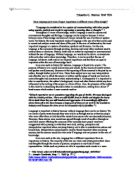The language of Social Science, History, and Ethics can be summed up to say that much of it is based on the perspective of the individual and how he or she perceives the information or knowledge at hand. Social Science is the language of people and their history, sociology, anthropology, economics, etc… Therefore, the interpretation of such actions and behaviors is left up to the individual to interpret and distinguish in analyzing that area of knowledge. History is the language of events and dates that occur in one’s past. But as the saying goes, “History is written by the victor.” Therefore, there is a lot of bias present in history because we often do not see or hear the other side of the story. The language of Ethics deals with the perspective of “doing unto others as you would have them do unto you.” Sounds easy doesn’t it? Yet why would there be a separate branch of knowledge for something that sounds so self-evident and explanatory? There must be some dispute or difference in perspective and understandably so simply because there are no guidelines or definitions like how there are in math. The same goes for Social Science and History. There is no index or glossary that ably gives you the “right” interpretation of the information. For example, when discussing the various cultures around the world, no historian, no expert, no college professor may determine which culture is better or worse than the other. That would be cultural chauvinism. Passing judgment already eliminates the impartiality of the matter and makes the language and knowledge flawed. The only thing we can do is analyze and compare the cultures to each other and embrace the similarities and differences within them. Language is equally important in all of these areas of knowledge simply because without it, there would be no progression in ideas or thought processes. Everyone would be narrow-minded and have one train of thought without being exposed to other perspectives and interpretation on the same issue. Language, then, is equally important in molding the human mind and its outlook on life and all its forms.
Art, by itself, has its very own language. It is not one that can be written nor symbolized nor even spoken. For many, it is a language of feeling and emotion that are awakened within oneself. The different art forms like theatre, visual arts, music, and dance all allow the audience or individual to put a piece of themselves in it to make it personal. Perhaps the inability to truly vocalize the art form is a limitation but personally, art is something for the individual to experience. The feeling and ambiance that is stirred from the various art forms is a language in itself. For example, you cannot put dance into words. How can you? Sure, you can give words to the type of movement that is performed but that isn’t all there is to dance is it? No, it is the feeling and experience you are left with after the curtains have gone down and the lights have dimmed. Therefore, the language of art is equally important as language is to any other area of knowledge because it is able to direct, express, and inform the individual of his or her own interpretation and perspective of the knowledge of art.
Last but not least, Natural Science has a language of its own as well. Like mathematics, language needs to be very specific as well in order to illustrate subtle differences. For example, velocity and speed have subtle differences. Velocity shows direction while speed simply shows the rate at which an object moves. Language in Natural Science is tricky because it includes both interpretation and a universal effect to it. By that I mean if I were to ask a student in Botswana about the Big Bang Theory, we would both be on the same page as to what it is but perhaps we would differ on the validity of it. Once again, does the language of Natural Science direct, express, and inform individuals of knowledge? It most definitely does in all aspects.
Despite it’s ability to play an equally important role in all areas of knowledge, language has many limitations and problems that applies to all areas. Firstly, two word codes sound the same like flower and flour. This can be very misleading. Tone can change the meaning of what you are trying to say especially when using sarcasm. The same word can have different meanings like the word “good”. This can be morally “good” or skillfully “good”. Using slang is very small group specific. With different words there are different cultural perceptions like fanny, chips, lolly, etc… With that comes different interpretations of words within a culture. Metaphors require a shared experience like the term “slam-dunk”. Someone who doesn’t play basketball would not know what that means. Idioms are a big miscommunication if you haven’t seen the idiom before. For example, “when in Rome, do as the Romans do.” As you can see, there are many factors that affect language and the way it is directed, expressed, and informed.
All in all, language plays many roles in all areas of knowledge. It is equally important in all aspect to not only progress the pursuit of knowledge but to direct, express, and inform other individuals as well. Although there are many limitations in language, it can be said that without language, there would hardly be any progress in ways of thinking and the knowledge acquired if it were not for the expression in language.






